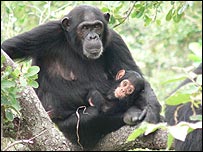Researchers report that the source of the HIV disease is found in wild chimpanzees living in southern Cameroon. Scientists believe that it was people who hunted chimpanzees for the first time who contracted the virus - and such cases were first seen in Kinshasa, in the Democratic Republic of the Congo - the closest urban area - in 1930

Researchers report that the source of the HIV disease is found in wild chimpanzees living in southern Cameroon. A virus called SIVcpz (Chimpanzee-derived simian immunodeficiency virus) was suspected as the source, but was only detected in a few captive animals. Now, an international team of scientists has identified a natural reservoir of SIVcpz in animals found in the wild. The findings are about to be published in the scientific journal Science.
Scientists believe that it was people who hunted chimpanzees for the first time who contracted the virus - and such cases were first seen in Kinshasa, in the Democratic Republic of the Congo - the closest urban area - in 1930.
Scientists believe that the rarity of cases - and the fact that the symptoms of AIDS differ significantly from one person to another - explains why it took another 50 years before the virus was given a name. This team of researchers, which includes experts from the University of Nottingham, Montpellier and Alabama, has been working for a decade to locate the source of HIV.
While SIVcpz was detected exclusively in captive animals, the possibility remained that other strains might be the natural reservoir of the HIV virus as well as SIVcpz.
Gene tests
SIVcpz can only be diagnosed using blood tests - which means that only captive animals could be studied. This study, carried out in collaboration with scientists from the "Cameroon AIDS Prevention Project" focused on analyzing chimpanzee feces, which was collected on the forest floor in remote jungle areas.
This was useful because scientists at the University of Alabama at Birmingham could determine the genetic sequences of the chimpanzees' viruses - which could be looked for in the stool samples.
Laboratory tests revealed specific antibodies to SIVcpz as well as genetic information associated with the virus in more than 35% of the chimpanzees in some groups. All the information was sent to the University of Nottingham for analysis, which revealed the great genetic affinity between some of the samples and the HIV strains. In chimpanzees in southeastern Cameroon, the virus is found in a form that is most similar to the HIV virus that has spread throughout the world.
The researchers say that in addition to solving the riddle as to the origin of the virus, the findings open the way for future studies. But SIVcpz has not been found to cause an AIDS-like disease in chimpanzees, so the scientists are investigating why the animals do not suffer from symptoms, while humans - who are so similar genetically - do.
Close system
Paul Sharp, professor of genetics at the University of Nottingham says: "It is likely that the jump between chimpanzees and humans took place in south-eastern Cameroon and from there the virus started to spread around the world. "When you consider the fact that HIV probably started developing more than 75 years ago, it is highly unlikely that there are other viruses out there that will prove to be more similar to the human virus." He further added that the team is currently working on investigating the question of whether the genetic difference between SIVcpz and HIV arose as a response to the jump between the species.
Keith Alcorn from AIDSMAP says: "The researchers have identified a very specific source from which they believe the HIV virus evolved. "But there are vast areas in West Africa where there are separate lineages of SIVcpz and the possibility of human infection still exists."
Yosef Azad, policy director for the National AIDS Organization in England, says: "This research is interesting because all the discoveries related to the history of the origin of HIV are valuable for the important work of scientists working on the development of a vaccine for HIV."
